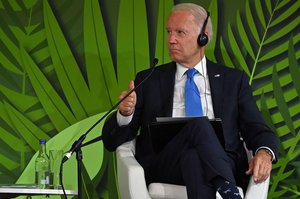In a significant development for the US’s role in global deforestation, President Biden’s recent Executive Order called for a ‘whole-of-government’ approach to combating deforestation, including recommendations for new legislation. Any incoming regulations must stop Wall Street from bankrolling forest destruction.

PA images / Alamy Stock Photo
As we revealed in our reports looking at the financing of global deforestation, one of the ways US financial firms exacerbate global warming is by routinely investing huge sums of money in climate-destroying practices. Companies razing forests to produce beef, palm oil, pulp, soy and rubber consistently secure financing for projects from banking giants on Wall Street.
As the International Panel on Climate Change’s (IPCC) most recent report made clear, we are on the edge of no return. For the first time in history, rampant deforestation means up to one fifth of the Amazon rainforest is releasing more carbon than it absorbs. Tropical primary forest loss in 2021 resulted in 2.5 gigatonnes of carbon dioxide emissions, equivalent to the annual fossil fuel emissions of India.
This cycle of destruction must end. The US was among over 140 countries that signed the Glasgow Leaders’ Declaration on Forests and Land Use, which commits to ‘halt and reverse’ deforestation by 2030. At COP26, Biden unveiled a US plan to conserve the Amazon rainforest and other critical ecosystems. The US has also committed last June to halting and reversing all biodiversity loss by 2030 under the G7 Nature Compact, and forests are home to 80% of the world’s terrestrial biodiversity.
On Earth Day 2022, President Biden took a potentially important step towards delivering these aims, signing an Executive Order promising to protect domestic forests, boost wildfire resilience and combat global deforestation.
Whilst media coverage of the Order focussed on implications for domestic forests and more recently on definitions of mature and old growth forest, it is also significant for the US’s role in global deforestation. The Executive Order commits the US government to a one-year process of developing a ‘whole-of-government’ approach to reducing or eliminating US purchases of products grown on illegally or recently deforested lands, including through public-private partnerships and potentially, new legislation.
Echoing this commitment to tackle global deforestation, US Special Presidential Envoy John Kerry met with Norwegian Prime Minister Jonas Gahr Støre in Oslo and released a landmark statement on deforestation: ‘Together, we will promote a shift in commodity and financial markets to advance deforestation-free commodity production, and enable the private sector to eliminate deforestation from supply chains and portfolios.’
In November 2021, House Majority Leader Steny Hoyer introduced the Amazon21, a bill establishing a $9 billion fund administered by the U.S. State Department to finance forest conservation and natural carbon absorption, the same amount President Biden pledged to contribute to fight deforestation at COP26.
Whilst welcome, such funding is fatally undermined if we continue to allow financing of forest destruction by US financial institutions.
In our recent investigation, Deforestation Dividends, we found that financial institutions in the UK, EU, US, and China ploughed $157 billion into agribusiness firms linked to tropical deforestation and associated human rights abuses over the five years since the Paris Climate Agreement.
Of this, $58 billion came from American financial institutions, who made an estimated $538 million from those deals connected to deforestation. JPMorgan was the single biggest financier of forest-destructive companies in our global analysis. In the five years after the Paris Climate Agreement, this company alone made deals worth $9.38 billion with firms that have fuelled rainforest destruction. Global Witness contacted JPMorgan for a response on its alleged deforestation links, but the bank declined to comment.
Ultimately, the only way to stop the money pipeline driving global deforestation is for Congress to turn off the tap by bringing in new rules.
As the Biden Administration takes the next year to prepare the report outlined by the Executive Order, a number of viable options are already on the table and there is a lot to learn from overseas where policies to reduce complicity in deforestation are further developed. In the US, the bipartisan Fostering Overseas Rule of Law and Environmentally Sound Trade (FOREST) Act, which prohibits agricultural commodities produced on illegally deforested land from entering the US market – would satisfy one objective in Kerry’s statement above. This Act would closer-align the US with EU and UK, where laws have either been passed or are well in train to end the market for goods sourced from deforested land and institute due diligence requirements on companies with penalties for non-compliance.
This would be a crucial first step in cleaning up US supply chains, but as Kerry’s statement implies, it’s not just the supply chains, but also the financing fuelling global deforestation that needs tackling.
The Federal Reserve Bank recognised climate change as an emerging and increasing threat to U.S. financial stability in October 2021, identifying deforestation as a key driver of ‘physical risk’ in a report published in response to an earlier Executive Order on climate-related financial risk.
Although lacking in bipartisan support, the Fossil Free Finance Act, would amend the Bank Holding Companies Act so that bank holding companies with more than $50 billion in assets are required to reduce and ultimately eliminate the financing of activities that contribute to greenhouse gas emissions and deforestation by 2050. It is time for all sides to take a good look at this Act and if they won’t back it, put their own proposals on the table to cut off the money pipeline from Wall Street to deforestation.
Never before has there been so much momentum on forests and finance. The Biden Administration must seize this opportunity to push through regulation in the US while there are still some forests left to save.

